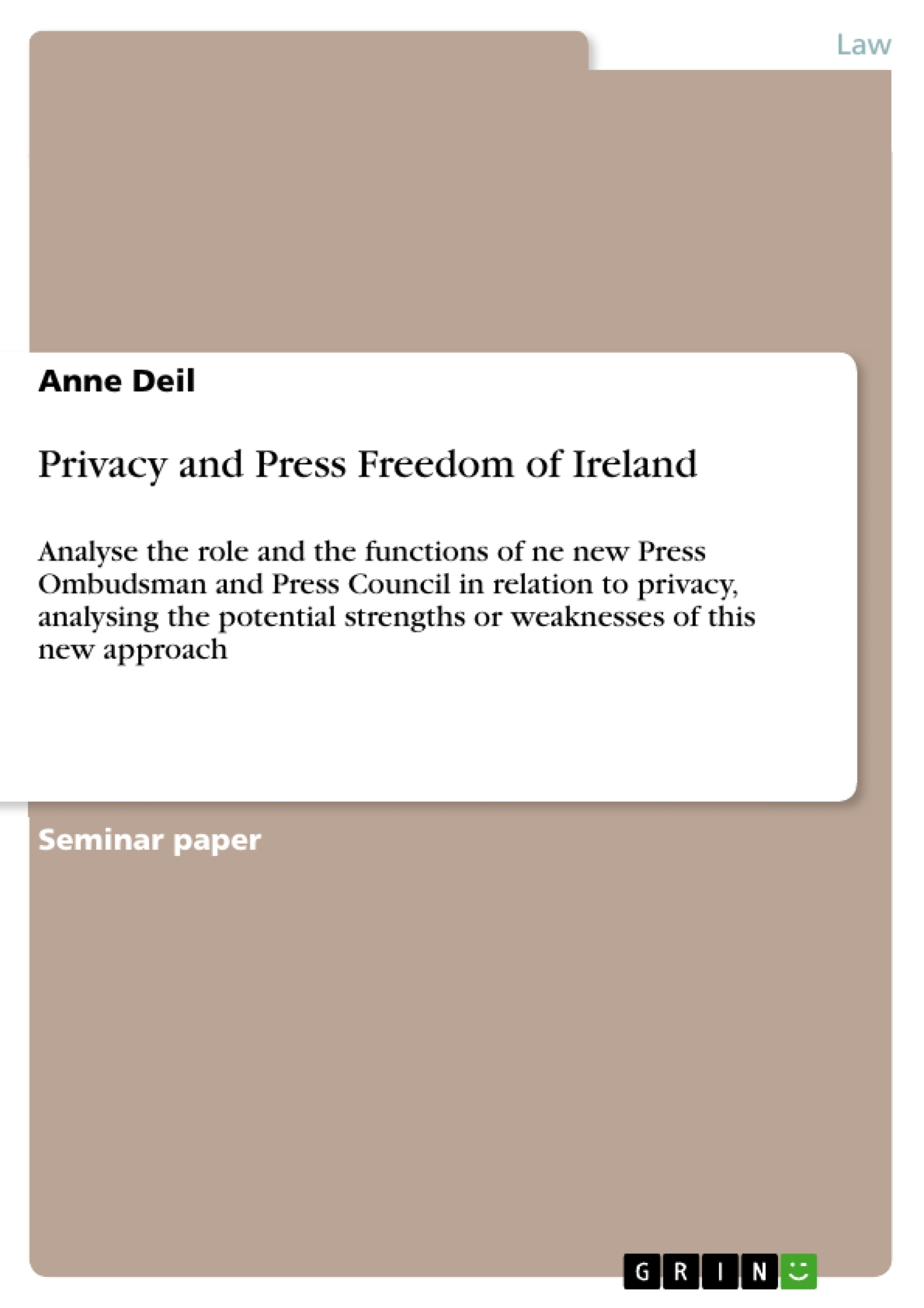For Irland’s history of newspapers and magazines the year 2008 will always remain a milestone. On January 1st the so-called Press Council and Press Ombudsman was inserted. This establishment stands for a very important development for the press industry. Acting Press Ombudsman is Professor John Horgan, who was elected on 14 August 2007 by the Press Council. Having a background in Journalism and Politics as Professor of Journalism at Dublin City University and being a member of the Irish Parliament he is now operating with the responsibility in the first press appeal mechanism that is free from the outside in the history if Ireland. (Press Council of Ireland, 17.11.2011, paragraph 3)
Whether this establishment brings advantages or disadvantages for both the people and the media is a quite interesting question. In the following I will mostly elucidate the Press Council in relation to privacy. For this purpose I am going to discuss the possible strengths or weaknesses of this new appendage.
Inhaltsverzeichnis (Table of Contents)
- The Establishment of a new System
- How the Press Council and Press Ombudsman works
- Strengths and weaknesses of the new institutions
- Is the new system profitable?
- Bibliography
Zielsetzung und Themenschwerpunkte (Objectives and Key Themes)
The main objective of this document is to analyze the role and functions of the new Press Ombudsman and Press Council in relation to privacy in Ireland. It examines the potential strengths and weaknesses of this new approach to press regulation.
- The establishment and operation of the Press Council and Press Ombudsman
- The strengths and weaknesses of the new institutions in relation to privacy
- The role of the Code of Practice in protecting privacy
- The definition and application of "public interest" in relation to privacy
- The independence and accessibility of the new complaints mechanism
Zusammenfassung der Kapitel (Chapter Summaries)
The first chapter discusses the historical significance of the establishment of the Press Council and Press Ombudsman in 2008, highlighting the introduction of a new system for press regulation in Ireland. It introduces Professor John Horgan as the first Press Ombudsman and emphasizes the importance of this new mechanism for both the public and the media.
Chapter two details the functionality of the Press Council and Press Ombudsman system. It explains the role of the Press Council in electing the Press Ombudsman and outlines the core objectives of both institutions, including upholding ethical standards, protecting press and public freedoms, and ensuring quality journalism. The chapter also emphasizes the commitment to providing a quick, fair, and free complaints resolution process.
Chapter three delves into the strengths and weaknesses of the new institutions, particularly in relation to privacy. It highlights the independence of the Press Ombudsman and Press Council from both government and the media, emphasizing their commitment to objective and transparent press regulation. The chapter then discusses the importance of the Code of Practice in safeguarding privacy and the role of the Press Ombudsman in ensuring its enforcement. It examines the potential challenges posed by the "public interest" exemption, which can limit the protection of privacy in certain situations. Finally, the chapter discusses the crucial role of the Press Ombudsman in mediating disputes and determining whether the public interest outweighs the right to privacy.
Schlüsselwörter (Keywords)
Key terms and concepts explored in this text include privacy, press freedom, Press Council, Press Ombudsman, Code of Practice, public interest, independence, complaints mechanism, ethical standards, and journalistic principles.
Frequently Asked Questions
When were the Press Council and Press Ombudsman established in Ireland?
The Press Council and Press Ombudsman system was officially inserted on January 1st, 2008, marking a milestone in Irish media history.
Who was the first Press Ombudsman in Ireland?
Professor John Horgan, a former Professor of Journalism at Dublin City University and member of the Irish Parliament, was elected as the first Press Ombudsman.
What are the core objectives of the Press Council of Ireland?
The core objectives include upholding ethical standards, protecting press and public freedoms, ensuring quality journalism, and providing a fair, quick, and free complaints resolution process.
How does the Code of Practice relate to privacy?
The Code of Practice serves as a benchmark for ethical journalism and contains specific provisions to safeguard the individual's right to privacy against unwarranted press intrusion.
What is the "public interest" exemption in press regulation?
The "public interest" exemption allows for the publication of private information if the Press Ombudsman determines that the benefit to the public outweighs the individual's right to privacy.
Is the Irish press complaints mechanism independent?
Yes, the mechanism is designed to be free from outside influence, including both government and direct media industry control, to ensure objective and transparent regulation.
- Arbeit zitieren
- Anne Deil (Autor:in), 2012, Privacy and Press Freedom of Ireland, München, GRIN Verlag, https://www.grin.com/document/195690



